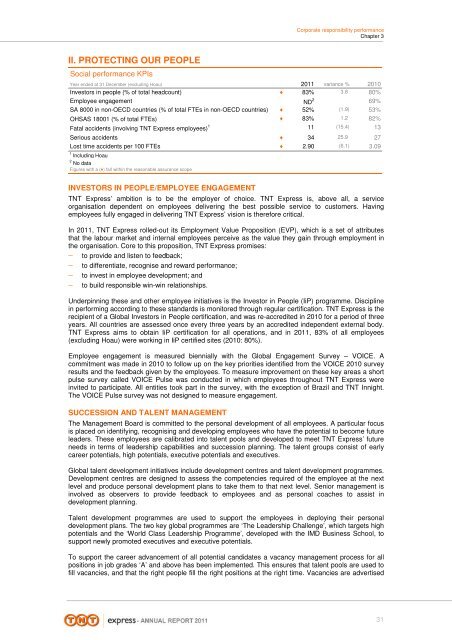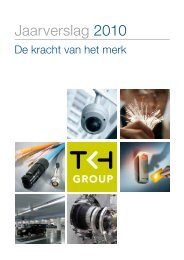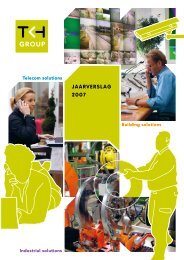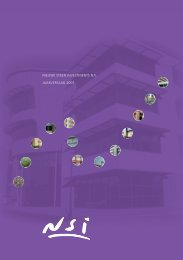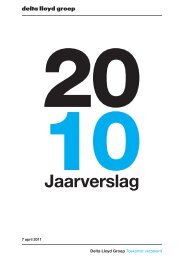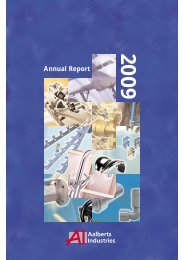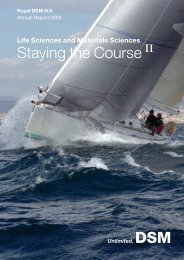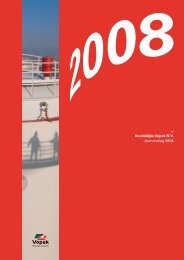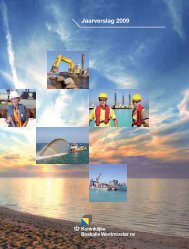TNT Express Annual Report 2011
TNT Express Annual Report 2011
TNT Express Annual Report 2011
Create successful ePaper yourself
Turn your PDF publications into a flip-book with our unique Google optimized e-Paper software.
Corporate responsibility performance<br />
Chapter 3<br />
II. PROTECTING OUR PEOPLE<br />
Social performance KPIs<br />
Year ended at 31 December (excluding Hoau) <strong>2011</strong> variance % 2010<br />
Investors in people (% of total headcount) ♦ 83% 3.8 80%<br />
Employee engagement ND 2 69%<br />
SA 8000 in non-OECD countries (% of total FTEs in non-OECD countries) ♦ 52% (1.9) 53%<br />
OHSAS 18001 (% of total FTEs) ♦ 83% 1.2 82%<br />
Fatal accidents (involving <strong>TNT</strong> <strong>Express</strong> employees) 1 11 (15.4) 13<br />
Serious accidents ♦ 34 25.9 27<br />
Lost time accidents per 100 FTEs ♦ 2.90 (6.1) 3.09<br />
1 Including Hoau<br />
2 No data<br />
Figures with a (♦) fall within the reasonable assurance scope<br />
INVESTORS IN PEOPLE/EMPLOYEE ENGAGEMENT<br />
<strong>TNT</strong> <strong>Express</strong>’ ambition is to be the employer of choice. <strong>TNT</strong> <strong>Express</strong> is, above all, a service<br />
organisation dependent on employees delivering the best possible service to customers. Having<br />
employees fully engaged in delivering <strong>TNT</strong> <strong>Express</strong>’ vision is therefore critical.<br />
In <strong>2011</strong>, <strong>TNT</strong> <strong>Express</strong> rolled-out its Employment Value Proposition (EVP), which is a set of attributes<br />
that the labour market and internal employees perceive as the value they gain through employment in<br />
the organisation. Core to this proposition, <strong>TNT</strong> <strong>Express</strong> promises:<br />
− to provide and listen to feedback;<br />
− to differentiate, recognise and reward performance;<br />
− to invest in employee development; and<br />
− to build responsible win-win relationships.<br />
Underpinning these and other employee initiatives is the Investor in People (IiP) programme. Discipline<br />
in performing according to these standards is monitored through regular certification. <strong>TNT</strong> <strong>Express</strong> is the<br />
recipient of a Global Investors in People certification, and was re-accredited in 2010 for a period of three<br />
years. All countries are assessed once every three years by an accredited independent external body.<br />
<strong>TNT</strong> <strong>Express</strong> aims to obtain IiP certification for all operations, and in <strong>2011</strong>, 83% of all employees<br />
(excluding Hoau) were working in IiP certified sites (2010: 80%).<br />
Employee engagement is measured biennially with the Global Engagement Survey – VOICE. A<br />
commitment was made in 2010 to follow up on the key priorities identified from the VOICE 2010 survey<br />
results and the feedback given by the employees. To measure improvement on these key areas a short<br />
pulse survey called VOICE Pulse was conducted in which employees throughout <strong>TNT</strong> <strong>Express</strong> were<br />
invited to participate. All entities took part in the survey, with the exception of Brazil and <strong>TNT</strong> Innight.<br />
The VOICE Pulse survey was not designed to measure engagement.<br />
SUCCESSION AND TALENT MANAGEMENT<br />
The Management Board is committed to the personal development of all employees. A particular focus<br />
is placed on identifying, recognising and developing employees who have the potential to become future<br />
leaders. These employees are calibrated into talent pools and developed to meet <strong>TNT</strong> <strong>Express</strong>’ future<br />
needs in terms of leadership capabilities and succession planning. The talent groups consist of early<br />
career potentials, high potentials, executive potentials and executives.<br />
Global talent development initiatives include development centres and talent development programmes.<br />
Development centres are designed to assess the competencies required of the employee at the next<br />
level and produce personal development plans to take them to that next level. Senior management is<br />
involved as observers to provide feedback to employees and as personal coaches to assist in<br />
development planning.<br />
Talent development programmes are used to support the employees in deploying their personal<br />
development plans. The two key global programmes are ‘The Leadership Challenge’, which targets high<br />
potentials and the ‘World Class Leadership Programme’, developed with the IMD Business School, to<br />
support newly promoted executives and executive potentials.<br />
To support the career advancement of all potential candidates a vacancy management process for all<br />
positions in job grades ‘A’ and above has been implemented. This ensures that talent pools are used to<br />
fill vacancies, and that the right people fill the right positions at the right time. Vacancies are advertised<br />
31


